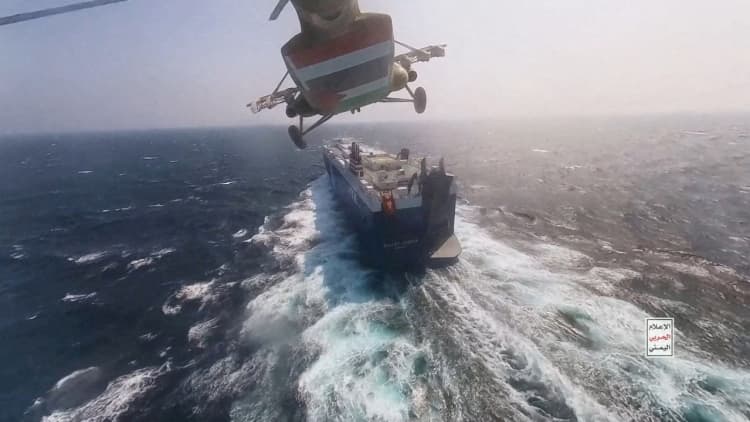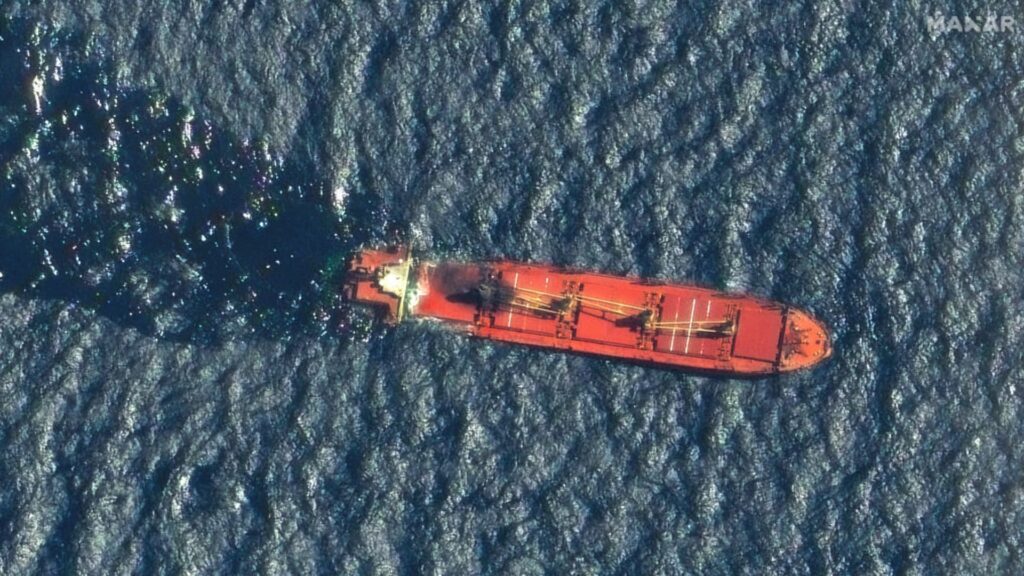Cargo ship Rubimar, Red Sea – March 1, 2024: Maxar close-up view of satellite images of the cargo ship Rubimar – just before it sank after being targeted by Houthi rebels last month.
Satellite image (c) 2024 Maxar Technologies | Getty Images
The US military confirmed on Saturday that a UK-owned ship attacked by the Houthis last month sank in the Red Sea, echoing a warning from Yemen's internationally recognized government that the ship's cargo of dangerous fertilizers poses a danger to marine life.
The Belize-registered ship, Rubimare, is the first ship to go missing since the Houthis began targeting commercial ships in November. Drone and missile attacks have forced shipping companies to divert ships to the longer route around South Africa, disrupting global trade by delaying deliveries and raising costs.
The sunken bulk carrier “also presents a risk of subsurface impact to other ships transiting the waterway's busy shipping lanes,” US Central Command (CENTCOM) said in its statement on the X social media platform.
The Iran-aligned Houthis, who control northern Yemen and other large centres, say their campaign is a show of solidarity with Palestinians in Gaza.

The Houthi attacks led to a series of strikes against their positions by the United States and Britain, and prompted other fleets to send ships to the region to try to protect the vital trade route of the Suez Canal.
The Rubimar ship sank in the southern Red Sea late Friday or early Saturday, according to data from the Yemeni government and US Central Command.
The US military said earlier that the missile attack on February 18 caused significant damage to the ship and caused an 18-mile (29-kilometer) oil slick. US Central Command said on Saturday that the ship was carrying about 21,000 metric tons of fertilizer.
Ahmed Awad bin Mubarak, Foreign Minister of the internationally recognized Yemeni government in Aden, said in a post on the X website: “The sinking of the Rubimar ship is an environmental disaster that Yemen and the region have not witnessed before.
“It is a new tragedy for our country and our people. Every day we pay the price for the adventures of the Houthi militia…”
The internationally recognized government, backed by Saudi Arabia, has been waging a war with the Houthis since 2014.
Marine life is threatened
Ali Al-Sawalma, director of the Marine Sciences Station at the University of Jordan, said that releasing these large quantities of fertilizers into the Red Sea poses a serious threat to marine life.
An overload of nutrients can stimulate excessive algae growth, consuming so much oxygen that normal marine life cannot survive, Al-Sawalmiya said, describing a process called eutrophication.
He stressed the need for the Red Sea countries to adopt an urgent plan to set a monitoring agenda for polluted areas in the Red Sea and adopt a clean-up strategy.
The overall impact depends on how ocean currents deplete the fertilizer and how it is released from the stricken ship, said Xingchen Tony Wang, an assistant professor in the Department of Earth and Environmental Sciences at Boston College.
The southern Red Sea ecosystem features pristine coral reefs, coastal mangroves, and diverse marine life.
Last year, the region averted a potential environmental disaster when the United Nations removed more than a million barrels of oil from a decaying supertanker anchored off the coast of Yemen. This type of operation may be more difficult in the current circumstances.

The Houthi attacks have raised fears that the war between Israel and Hamas could spread, destabilizing the wider Middle East.
In a separate report, UKMTO said it had received a report of a ship being attacked 15 nautical miles west of the Yemeni port of Mokha.
“The crew took the vessel to dock and were evacuated by military authorities,” the UKMTO said in an advisory note.
The Italian Ministry of Defense also said that one of its naval ships shot down a drone flying towards it in the Red Sea.
On the other hand, the Houthi Ministry of Transport said that there was a “defect” in marine communications cables in the Red Sea as a result of the actions of American and British naval ships. No further details were given.
